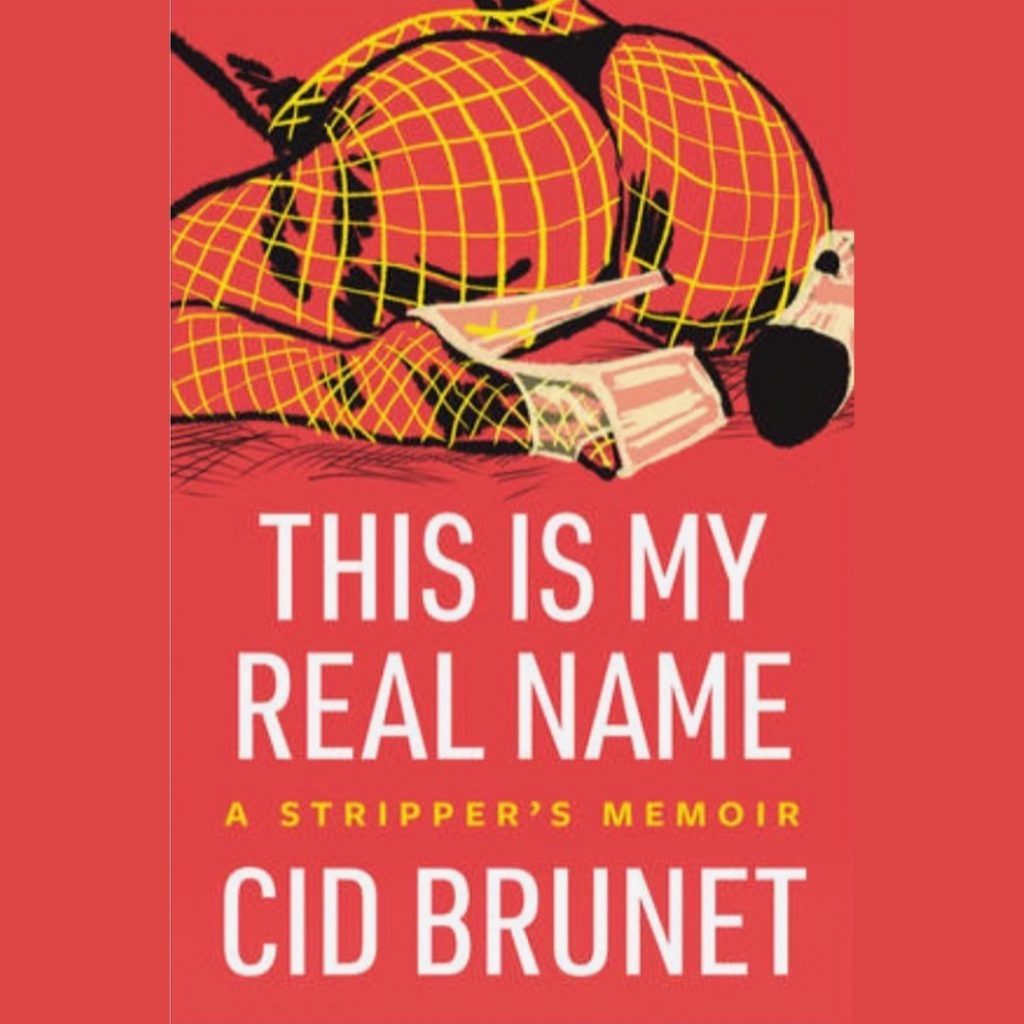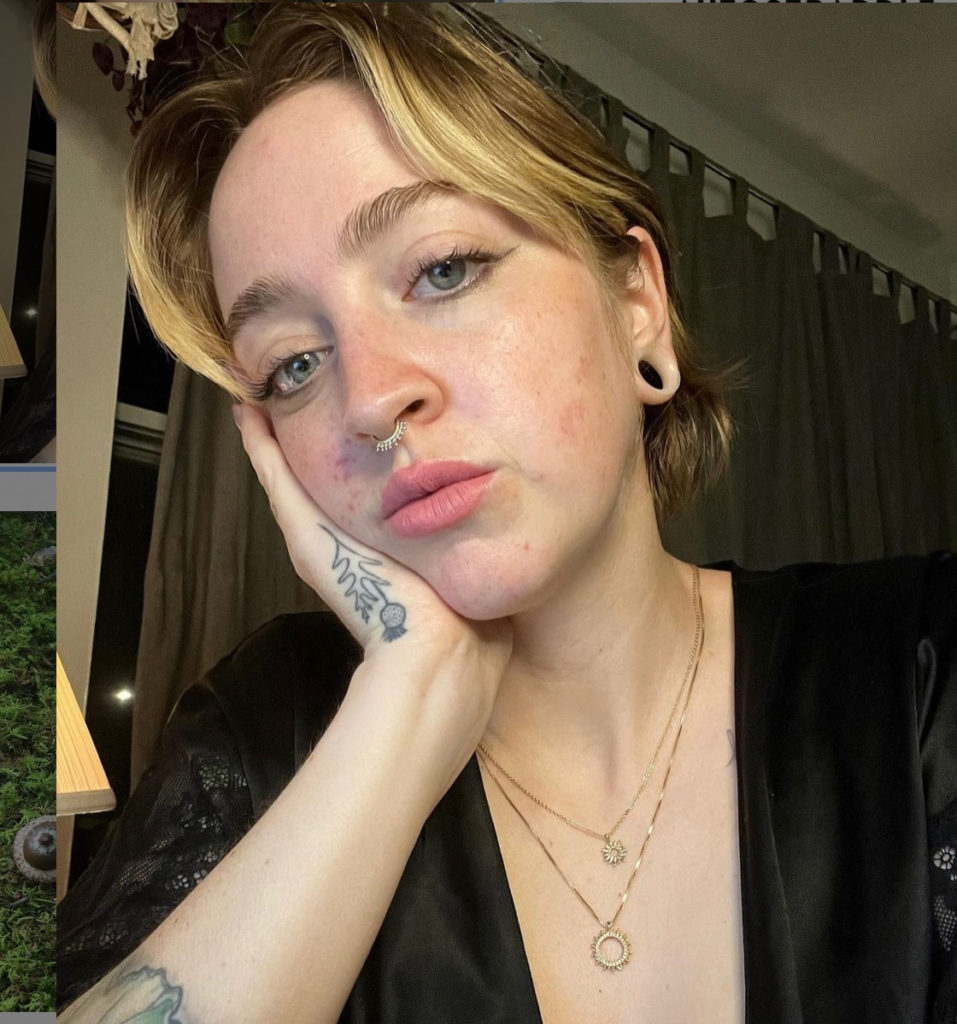By Gail Picco December 20, 2021

This is my real name: A stripper’s Memoir, Cid Brunet, Arsenal Pulp Press, November 2, 2021, 320 pp., $22.95
This last time I visited a strip club was with a group of friends on a party evening, sometime in the mid to late aughts. We ordered a $99 bottle of Freixenet, which sells for $13.95 at the liquor store, and settled in for the show. While I had been in strip clubs before, it was my first time at the legendary Jilly’s on Queen Street East in Toronto.
And I don’t know whether if it was the stage set up at Jilly’s or simply how this one dancer worked, but pre-show she was sitting at a table not far from ours and when it was time for her routine, she simply walked up to the stage, dropped her purse on the side of the stage where she could keep an eye on it, and began to dance. Aretha Franklin used to do the same damn thing, even when she sang (You make me feel like) Natural Women at the Kennedy Centre Honours for Carole King. And after reading Cid V. Brunet’s, This is my real name: A Stripper’s Memoir, I now know for sure why.
Jillly’s was closed in 2014 , bought to be redeveloped as a boutique hotel which now rents rooms for $300 a night. At the time, Kaleigh Rogers of the Globe and Mail wrote that with “body-rub parlours now licensed in the city of Toronto, it’s become increasingly difficult for exotic dancers to compete for clients’ attentions. The Adult Entertainment Association of Canada has rallied to allow brothels to operate in strip clubs, cranking up the pressure for strippers to do more than dance.”
This is my real name by Cid Brunet is one woman’s guide to humankind through the background of the strip club circuit. Brunet’s crisp dialogue puts you in the dressing room, VIP lounge, on the pole, or in the middle of a mental collapse, wherever they want you to be so they can explain to you this microcosm of civilization, at once a gladiators’ pit, a hypnotic and intimate sexual emporium, the set of the movie Norma Rae, or an episode of Cheers.
Cid Brunet, who went by the stage name Michelle and ended up working as a stripper for 10 years, started their career when they and their girlfriend Izzy began stripping for a decent wage.
The book does not come without a dose of wry humour. But the receipts from one night of work tell the tale.
“When the bar closes, Izzy and I hail a cab and count our money in the backseat.
I’d been looking for a way out of working exploitative, underpaid kitchen jobs when I found a roofing company hiring on Craigslist … In the end, the boss said he didn’t need me anymore and gave me a paycheque that covered all my expenses and a little extra. The cheque bounced.
I lean back in the cab and recount the cash in my hand. Shocked into silence by making my rent in five hours.
This changes everything.“
Humanity in its kindness, vulgarity, cruelty, and petty ways is well represented in This is my real name. But Brunet understands where this fits in the outside world and – perhaps somewhat in hindsight and in their writerly training – they narrate their own life with a learned sociological interpretation.
In 2014, the federal government made it a crime to pay for sex work but not to be a sex worker. These laws don’t protect sex workers from being vulnerable to having their human rights violated. Especially Black, Indigenous, trans, and migrant sex workers, and sex workers who use drugs. That’s why many pro–sex worker organizations advocate for full decriminalization of sex work, to combat violence, stigma, and exploitation… From my privileged status as a stripper who works indoors and chooses, or refuses, to offer extras, I’m rarely in a position where I could be arrested, but every time I go downstairs [where sex work takes place] I’m taking a calculated risk and fear hangs over me.
Brunet then describes a scene where they do go downstairs and “sees a naked girl standing on the bed” who introduces herself as Lydia. She’s in the company of Sean, the Bus Driver and a man named Harry. She’s suggested they all do lines of coke off Brunet/Michelle’s chest.
Harry taps enough powder onto my sternum to show no one is playing around tonight … [Lydia] inhales the line without a straw and cleans the crumbs with her tongue, giving me goosebumps … While the men take turns doing rails off my chest, I zone out …
“Sean, looks like you’re going to pass out,” Lydia says. “Don’t give up on me now …”
“That girl is too much,” says the Bus Driver. He is bug-eyed, sitting on a chair shaped like a red velvet high heel, like an oversized fairground toy.
“She is too wild for me,” Sean agrees. “We found her on Backpage last night and she came right over.Didn’t even bat an eyelash showing up to Harry’s apartment where three strange men were on day fourof a bender. First thing Crazy does? She pulls out a bag of mushrooms! She’s lucky it was us—could have been anyone.”

This is my real name is so much more than a sex-worker authored memoir, a growingly necessary genre that replaces males fetishization of sex work. But Brunet, using the backdrop of strip clubs to map out humanity, reveals the ways in which women use their femininity to survive in the world and the choices men make to how they will use their masculinity. Whether we work in a strip club, where sexual favour is openly being traded, or a corporation or a charity or live in a prison, a boarding school or army base, choices are always there to be made.
Even though the physically and emotional demands of stripping for a living are barely sustainable, the choices Brunet makes in what to write about tells us their light house is directed towards humanity.
“I’ll pay you to sit this song out,” a client in the VIP says frantically. “It’s my wedding song.”
Cid Brunet can write. Of that there is no question. Consummately.
This is my real name is one of The Charity Report’s best 10 books of 2021.
Other reviews by Gail Picco
Christi Belcourt: The brilliance of a great artist December 16, 2021
Lucy Bernholz and ‘How we give now’: The most important book on philanthropy October 14, 2021
Fred Sasakamoose: Call Me Indian October 12, 2021
#BlackinSchool: How school reinforces racism September 12, 2021
Likeness by David Macfarlane: A father’s thoughts of a future without his son July 26, 2021